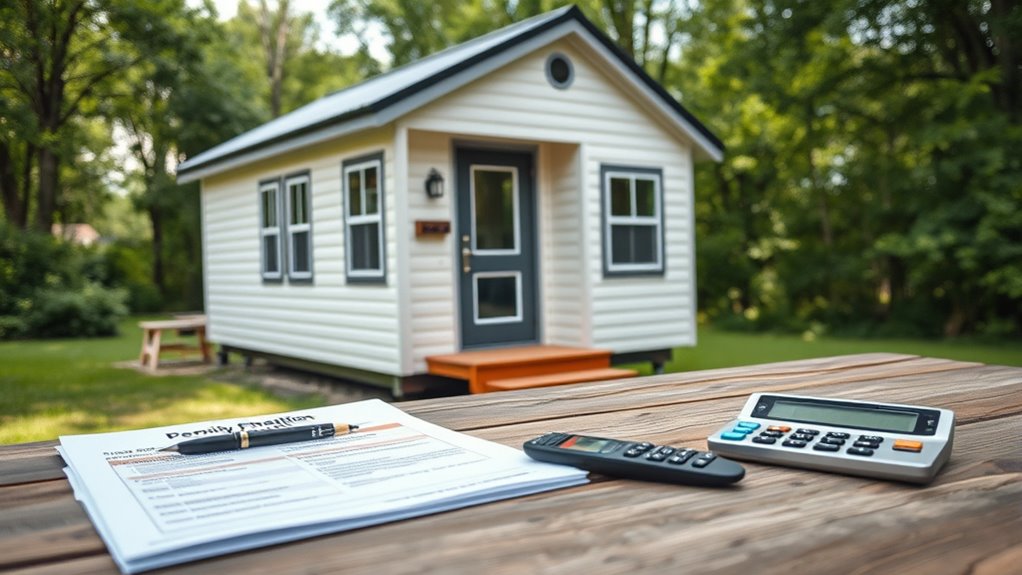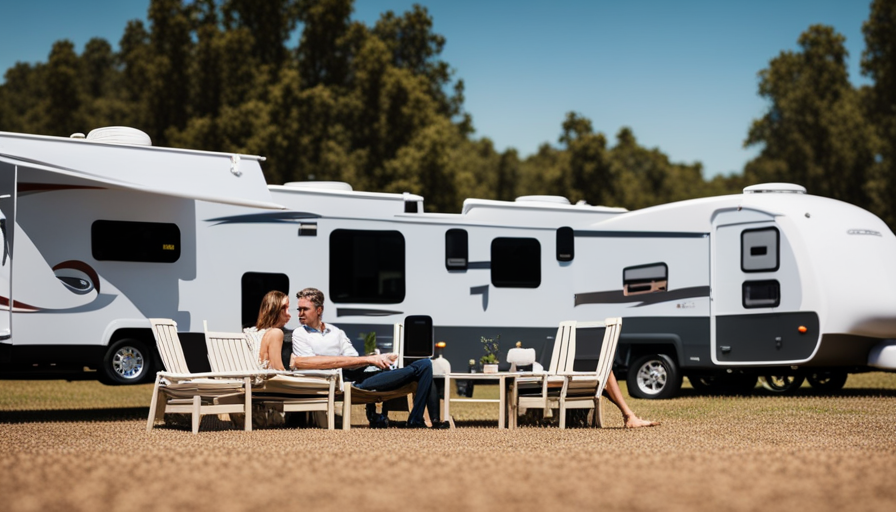When considering tiny houses, it’s important to check local zoning rules, as some areas restrict placement or require permanent foundations, while others treat them as RVs or accessory units. Financing options vary—some lenders consider them personal property, making traditional mortgages difficult, so you may need specialty loans. Insurance coverage can be tricky too, often falling between standard home and RV policies. To fully understand this complex landscape and find the best fit, keep exploring the key factors involved.
Key Takeaways
- Check local zoning laws to determine whether tiny houses are permitted as permanent foundations or RVs.
- Understand that insurance options vary; some policies treat tiny homes as mobile or recreational vehicles.
- Tiny house financing may be limited; consider personal loans or loans for mobile/manufactured homes.
- Permanent foundation tiny homes are more likely to qualify for traditional mortgage options.
- Stay informed on evolving regulations and market trends to ensure long-term legal and financial stability.

Are you curious about tiny houses and whether they’re the right choice for you? If so, you’ve probably started thinking about the practical aspects, like financing and permits. One of the first hurdles you might encounter involves zoning restrictions. Different areas have varying rules about where tiny houses can be placed. Some neighborhoods have strict zoning laws that classify tiny homes as accessory dwelling units or recreational vehicles, which can limit where you can build or park your tiny house. Before you get too excited, you’ll want to check with local zoning offices to understand what’s allowed in your desired location. Some jurisdictions require tiny houses to be on permanent foundations, while others might allow them as RVs or mobile homes, which impacts your options considerably. Knowing these restrictions early on can save you time and money, helping you avoid building something that’s not legally permitted.
When it comes to insurance requirements, you need to approach this carefully. Tiny houses often fall into a gray area between traditional homes and RVs, which can make insuring them a challenge. Some insurance companies treat tiny homes as mobile homes or RVs, offering policies that cover theft, fire, and liability. Others might require you to purchase specialized coverage, which can be more expensive or harder to find. If your tiny house is on a permanent foundation, you might be able to insure it like a traditional home, but that depends on local laws and the insurer’s policies. It’s essential to shop around and compare policies to find the coverage that suits your needs and budget. Keep in mind that some lenders may also have specific requirements for financing tiny houses, especially if they’re classified as personal property rather than real estate. This can influence whether you’re able to get a mortgage or if you’ll need to opt for personal loans or financing options tailored for mobile or manufactured homes. Additionally, understanding market growth projections can help you anticipate future trends in tiny house financing options and insurance availability.
Understanding these factors—zoning restrictions and insurance requirements—can seem overwhelming at first, but doing your homework makes the process smoother. Start by researching local laws and talking to insurance agents who understand tiny house coverage. This way, you’ll know what’s feasible and how much you’ll need to budget for permits, insurance, and potential legal fees. Being informed helps you make smarter decisions and ensures that your tiny house journey is as hassle-free as possible.
Frequently Asked Questions
Can I Finance a Tiny House With a Traditional Mortgage?
You generally can’t finance a tiny house with a traditional mortgage because of tiny house financing options and zoning restriction challenges. Lenders often see tiny homes as personal property rather than real estate, making it tough to secure a standard mortgage. To finance your tiny house, explore options like personal loans, RV loans, or specialized lenders who understand tiny house financing options. Be prepared to navigate zoning restrictions that might limit where you can place your tiny home.
Are Tiny Houses Eligible for Government Grants or Incentives?
You might be eligible for government grants or incentive programs if your tiny house meets specific criteria, like being energy-efficient or eco-friendly. Check local, state, or federal initiatives that promote sustainable living or affordable housing, as they often offer financial incentives or grants. While not all tiny houses qualify, doing thorough research and working with relevant agencies can increase your chances of securing these benefits.
How Do Property Taxes Apply to Tiny House Ownership?
Property taxes on tiny houses are surprisingly straightforward—think of it as a tiny universe with big rules. Your property tax assessment depends on valuation methods, which consider factors like size and location. Usually, tiny houses are taxed as personal property or real estate. You’ll need to check local laws, but in most cases, you’ll pay property taxes based on your tiny home’s assessed value, just like any other property.
What Are Common Zoning Restrictions Impacting Tiny Houses?
Zoning codes and land use regulations often restrict where you can place your tiny house. Many areas have minimum size requirements or prohibit tiny houses in certain zones like commercial or agricultural land. You might also face restrictions on setbacks, parking, or whether you can live full-time in a tiny house on your property. Check local zoning laws carefully to verify your tiny house complies with all land use and zoning codes before building or parking.
Can I Build a Tiny House on a Mobile Home Park Lot?
Yes, you can build a tiny house on a mobile home park lot, but you’ll need to check the park’s policies first. Mobile home parks often have specific lease agreements and restrictions about adding tiny houses. Make sure to review your lease and get the park’s approval. Additionally, confirm that your tiny house meets local zoning and safety standards to avoid issues down the line.
Conclusion
Thinking about building or buying a tiny house? Remember, nearly 70% of tiny homeowners finance their homes through personal savings or loans, so you’re not alone. With proper permits and planning, you can enjoy the freedom and affordability tiny living offers. Don’t let questions about financing and permits hold you back—research thoroughly, stay informed, and take the leap toward your compact, cozy future!









